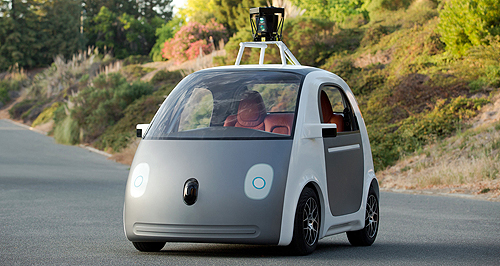Make / Model Search
News - General News - TechnologyDriverless cars on UK roads by 2015Brave new world: Google’s Driverless electric car experiment is paving the way for vehicles requiring no human input – but humans are the limiting factor as they are slow to accept change. The United Kingdom to have driverless cars testing on roads within six months31 Jul 2014 THE British government has announced a competition which will see driverless cars take to the streets of the United Kingdom sometime next year. The announcement, which was made by the UK government’s business secretary Vince Cable this week, gave the green-light to autonomous vehicle testing in 2015. Where the testing will be held, however, will be decided through a competition run by the government. Cities throughout the UK are being invited to partner with businesses and research institutions to put forward a proposal to run driverless vehicle testing. Three cities will be chosen with testing expected to start in January 2015 that will run for between 18-36 months. The business partners of each test location are expected to incur 70 per cent of the costs of the testing and all bids must include a partnership with a local authority. A prize of £10 million ($AU18 million) will be shared among the three winners and go some way to assisting in the projects which could cost between £5-£10 million ($AU9-$18 million). Speaking at the Mira research facility on Wednesday, business secretary Mr Cable said the competition is part of the UK government’s plan to establish Britain as a world leader in driverless-car technology. “The excellence of our scientists and engineers has established the UK as a pioneer in the development of driverless vehicles through pilot projects,” Mr Cable said. “Today’s announcement will see driverless cars take to our streets in less than six months, putting us at the forefront of this transformational technology and opening up new opportunities for our economy and society.” British ministers have also launched a review to examine how current road regulations will need to be altered to accommodate the arrival of driverless vehicles. Two major factors will be central to the review: driverless cars with a driver who can take control if necessary and fully autonomous cars without a driver. While the British government’s project may be the largest-scale plan to test driverless cars, it is not the only one working on the technology. In the United States the Defense Advanced Research Project Agency (DARPA) has been developing the autonomous vehicle technology for years but mainly for military applications. In May this year internet giant Google unveiled its self-driving car and is currently testing functional prototypes on city streets in the US. Volvo, too, announced its Drive Me project last year which will test self-driving cars in Gothenburg, Sweden, but not until 2017. Meanwhile car-makers such as Nissan, Volkswagen, Mercedes-Benz and Toyota are developing autonomous car technology, too. In Australia there are several research initiatives taking place with goals to produce self-driving vehicles. In February this year a partnership between the University of NSW and car-sharing company GoGet was announced at the GeoNext technology conference in Sydney. The plan is to develop an advanced autonomous driving algorithm with a goal of having self-driving cars within 10 years. GoAuto asked the Australian federal minister for infrastructure and regional development Warren Truss what initiatives the government was engaged in to support the development of driverless cars. A spokesman for Mr Truss said the government valued the benefits of driverless technology. “Driverless vehicle technologies hold the promise of significant safety and productivity benefits for industry and the broader community,” the spokesman for Mr Truss said. “The technology required for driverless vehicles is being developed globally. Much work is required by industry and governments to consider the policy, operational and regulatory issues associated with such initiatives to ensure they could be implemented safely. There are a range of bodies in Australia exploring issues associated with driverless vehicles. “More immediately, consumers are already benefitting from an array of autonomous or semi-autonomous safety features such as Electronic Stability Control and automatic headlights. Australia works with other countries to ensure there is common regulatory framework enabling those features or requiring them where there are proven benefits.” With applications closing on September 24 for the UK’s driverless car competition, Britain looks set to beat the rest of the world in rolling out a large-scale test of driverless cars. The progress of this testing will no doubt be followed with great interest by the auto industry as more car-makers adopt driverless technology.  Read more |
Click to shareGeneral News articlesResearch General News Motor industry news |












Facebook Twitter Instagram